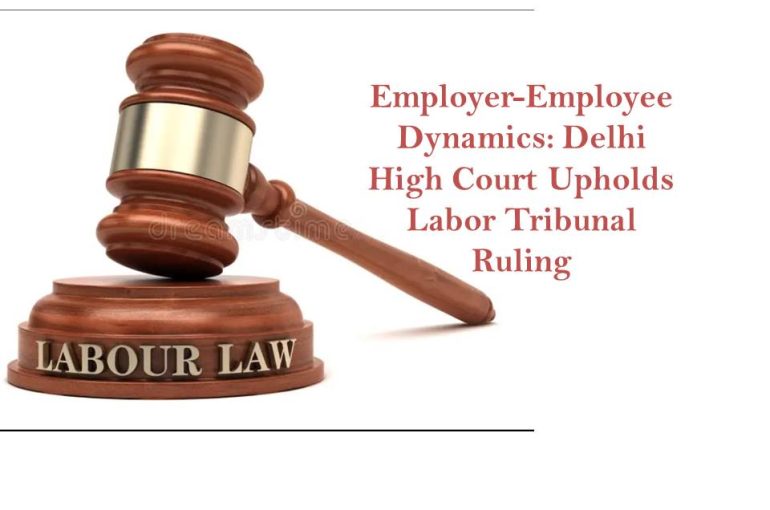Employer-Employee Dynamics: Delhi High Court Upholds Labour Tribunal Ruling
The Delhi High Court, presided over by Hon’ble Justice Girish Kathpalia, delivered a pivotal judgment on November 29, 2024, in the case of Satish Kumar v. Holistic Child Development India and Others, W.P.(C) 5664/2010. The case revolved around labour law, with the Petitioner challenging the Labour Court’s Award that denied the existence of an employer-employee relationship and excluded the Respondent from the definition of “industry” under Section 2(j) of the Industrial Disputes Act, 1947.
Background of the Case
The Petitioner, Satish Kumar, alleged that he had been employed by the Respondent, a charitable trust, since 1995 as a permanent employee with a monthly salary of ₹3,120. He contended that the Respondent misclassified him as a daily wager and denied statutory benefits. In October 2005, the Respondent allegedly terminated his services unlawfully, prompting him to seek reinstatement and back wages. The Respondent, however, refuted these claims, asserting that Kumar was never formally appointed and worked sporadically as a cleaner for a daily wage.
The Labour Court, on April 13, 2010, ruled against Kumar, finding no proof of an employer-employee relationship and holding that the Respondent did not qualify as an “industry.” Dissatisfied with this outcome, Kumar filed the present Writ Petition under Article 226.
Issues Examined by the High Court
The Court considered the following critical issues:
- Whether the Respondent qualifies as an “industry” under Section 2(j) of the Industrial Disputes Act.
- Whether an employer-employee relationship existed between the Petitioner and the Respondent.
Judgment Analysis
- On the Question of “Industry”
The High Court upheld the Labor Court’s conclusion that the Respondent, a charitable trust dedicated to aiding poor, orphaned, and destitute children, did not constitute an “industry.” Citing the Petitioner’s failure to provide evidence supporting the claim that the Respondent engaged in industrial activity, the Court relied on State of Gujarat v. Pratamsingh Narsinh Parmar (2001) to assert that the burden of proving industrial status rested on the claimant. Testimony from the Respondent’s representative further established that the organization’s activities were purely charitable, thus falling outside the ambit of Section 2(j). - On Employer-Employee Relationship
The Court emphasized the Petitioner’s inability to produce any substantive evidence, such as an appointment letter or employment records, to demonstrate his permanent employment. Payment vouchers submitted by the Petitioner, which indicated wages for ad hoc cleaning tasks, undermined his own claims. The Petitioner also failed to specify his job title or summon official employment records.
The Court concluded that the Petitioner’s allegations lacked credibility, and the Labor Court’s finding of no employer-employee relationship was not open to judicial interference. - Scope of Judicial Review under Article 226
Justice Kathpalia outlined the limits of judicial review in labor disputes, emphasizing that the High Court does not function as an appellate body under Article 226. The Court cannot re-evaluate evidence or overturn factual findings unless they are unsupported by evidence or vitiated by procedural impropriety. The Petitioner’s arguments, lacking substantial evidence, did not meet the threshold for judicial interference.
Citing landmark precedents like Sangram Singh v. Election Tribunal, Kotah, 1955 SCC OnLine SC 21 and Indian Overseas Bank v. IOB Staff Canteen Workers Union AIR 2000 SC 1508, the judgment reinforced that Writ Jurisdiction should not substitute the Labor Court’s fact-finding role.
Conclusion
The High Court dismissed Satish Kumar’s Writ Petition, upholding the Labor Court’s findings. This judgment reiterates essential principles regarding labor law disputes, particularly the burden of proof in claims of industrial status and employment relationships. Moreover, it underlines the restrained scope of judicial review under Article 226, particularly in labor matters, where fact-finding tribunals enjoy significant autonomy.
Shikha
Associate
The Indian Lawyer & Allied Services
If you are interested in learning more on “Judicial Review” log on to our YouTube channel The Indian Lawyer Legal Tips and watch the episode on Judicial Review on the link below:





































Leave a Reply